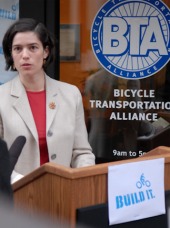
Michelle Poyouorow at the
campaign launch.
(Photo © J. Maus)
The Bicycle Transportation Alliance (BTA) has launched a new campaign to hasten progress on the Portland Bicycle Plan for 2030. The campaign is called “Build It,” and with an emphasis on social media and a new blog at PortlandBikeNetwork.org, the BTA hopes it will put pressure on city leaders to build out the bike plan once it’s adopted on February 4th.
Speaking at a press conference this morning, BTA Advocacy Director Michelle Poyourow said,
“This plan can make Portland America’s most healthy city, but only if it is adopted and built… Most plans sit on a shelf… But this plan will be different; it will be built and it will be built quickly. This plan will not sit on the shelf…
So today, the BTA is calling on the City of Portland to take the Portland Bicycle Plan for 2030 and build it!”
Mel Rader, the Co-Director of Upstream Public Health also spoke at the event:
“We are coming behind this plan because by investing in a more safe and efficient system for getting place-to-place through biking and walking we provide healthier options for Portlanders. Research shows that commuting by bicycle or walking can add several years to your life… That’s why we’re supporting the plan. We’re asking it to be built, because it’s a win-win for promoting healthier options for Portland, for addressing greenhouse gas emissions, and for creating jobs in a hard economy.”
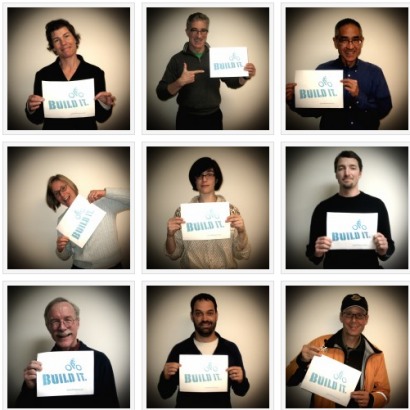
In the Q and A session at the press conference this morning, the BTA’s Poyourow was asked by a local TV reporter, “How do you propose to that the bike community pay for the bike lanes? There’s no tax generation from bike lanes…that comes from the gas tax. And money is tight, how to you get bicyclists to pay for this?”
In response, Poyouorow said,
“Many of the proposals in the plan are very affordable. Biking is one of the most affordable investments we can make. All people need to feel comfortable bicycling is smooth pavement and a backstreet.”
She also pointed out that there are many sources of funding for transportation projects besides the gas tax:
“There are also development charges, property taxes, regional funds, and federal funds. All of these funds can be directed to bicycle transportation — if we have the right plans in place and if we get serious about building bicycle infrastructure. In addition, because bicycle infrastructure is so inexpensive compared to auto-oriented infrastructure — and even transit infrastructure — we get a really good bang for the buck.”
I asked Poyourow how “Build it” translates into specific actions they’re calling on the city to take. Here is her response:
“We’re calling on Portland City Council to not just adopt this plan, but to take first steps right away toward getting it built. That means building new bike boulevards, new safe crossings, and new safe routes to schools in the first year. That means developing new sources of funding and re-allocating funding to the very efficient investment that is bicycle transportation. We cannot wait until year 5 or year 10 to know whether we’re succeeding in making Portland America’s healthiest city or not. We’ll need to start right away.”
The BTA has launched a new blog at PortlandBikeNetwork.org as the campaign’s online headquarters. The focus of the viral aspect of the campaign is to have people take their photo with the “Build It” logo and upload the photo to the site and/or Twitter, etc… They’ve got a “Twitter toolkit” page on the campaign website with instructions.
As people upload photos, they are featured in a gallery with different sections for “Ambassadors,” “Supporters,” and “Businesses.”
Once the plan is adopted by City Council, the BTA will use the site to track progress on bike infrastructure projects. Check out PortlandBikeNetwork.org for more and spread the word.


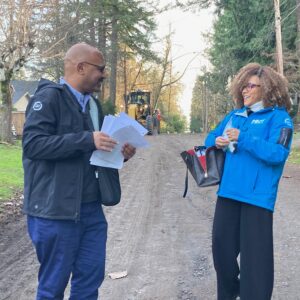
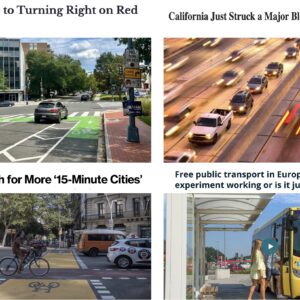
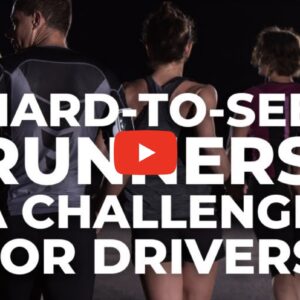

Thanks for reading.
BikePortland has served this community with independent community journalism since 2005. We rely on subscriptions from readers like you to survive. Your financial support is vital in keeping this valuable resource alive and well.
Please subscribe today to strengthen and expand our work.
The BTA doesn’t need to convince the City Council to move forward with the Bike Master Plan. It’s the people who are going to pay for it, the tax payers,that need convincing. Remember only 6% commute by bike. Mayor Adams has always said “investments in bike infrastructure offer the best return on transportation investment.” Having the Bike Master Plan “shovel” ready leaves it open to “job stimulus” opportunities, which could actually get it done faster than 2030. The BTA needs to convince the public at large about the benefits of spending on the Bike Master Plan: less congestion on major roads, less CO2, safe routes for kids, the health benefits, helping keep gas prices down by demanding less.
It’s going to be a big job for the BTA to tackle, they know everyone is watching. I wish the BTA the best of luck with the Build It campaign. I hope they have volunteer opportunities available for people that want to see the plan move forward.
What now BTA? smoke and mirrors? we’ll see…
The usual cast of characters are preaching to the same choir using social networking tools that largely depend on the interested individual to elect themselves to follow the message. Hmmm…
The greater public that actually needs convincing? Unless they stumble across it, they will not get the message. The mainstream media won’t shill for it and they seem to be asking the tougher questions which, of course, were answered in the usual wonky way that fails to resonate with the common man. What is their benefit? Why should they support it? Why should their tax dollars pay for something they likely will not use?
But the website looks all slick.
When bikes are registered, licensed, taxed and the riders required to pass a license exam with a practical as well as written then I will support bikes on the roads. Build overhead bike paths suspended above and away from vehicles. I used to bike but can’t anymore besides I can’t haul hay or livestock by bike.
Hi BTA Folks,
snazzy logo – it would look great as a sticker on my bike or plastered on corrals and bike staples. The BTA should open an account with Cafepress and sell stickers. The profits from the sales can be channeled back into the BTA. I know I definitely would buy a few stickers – way better than killing my toner cartridge and wasting paper.
-stephen
This campaign ducks the real (hard) work that gets things done: connecting with real people. Take a page from the public employee unions that are the muscle behind Measures 66 and 67 and launch a serious GOTV effort. And if you don’t know what GOTV stands for, you’ve got a lot to learn, BTA.
Observation: Enviros are terrible organizers. Have been for decades. Prissy white collar micro beer drinking Don Quixotes. No wonder people tune it out. Good luck with your Blackberry/iPhone campaign.
Expecting that only bicyclists can or should pay for new bike infrastructure is like expecting people who pick up trash can and should pay for new public garbage cans.
(somebody has to do it)
When cars are registered, licensed, and taxed to the extent that they pay for the entire cost of the infrastructure they use up, and when drivers are required to pass a license exam with practical, written and psychological components that demonstrate they understand a car is a multi-thousand pound killing machine that requires full concentration every second that it’s moving, then I will support cars on the roads. Build underground tunnels buried far below humans and their self-powered vehicles, that keep their exhaust contained. I used to drive but I found it so distasteful that I don’t anymore, besides I can’t enjoy myself or smell the flowers by car.
(there, fixed it.)
That joker posted the same thing over at KGW’s article. Also, Vance is complaining that bike paths offend his sense that vehicular cycling is the only true way to enlightenment. Fine that he does that here, but no the anti-bike faction will have a new (bogus)argument. Thanks, Vance!
Peejay # 8 –
Perfect.
If it works, I added the bold in the following excerpt:
“In the Q and A session at the press conference this morning, the BTA’s Poyourow was asked by a local TV reporter, “How do you propose to that the bike community pay for the bike lanes? There’s no tax generation from bike lanes…that comes from the gas tax. And money is tight, how to you get bicyclists to pay for this?”
In response, Poyouorow said,
“Many of the proposals in the plan are very affordable. Biking is one of the most affordable investments we can make. All people need to feel comfortable bicycling is smooth pavement and a backstreet.”
The reporter asked questions that many metro area residents want adamantly demand answers to, but Poyouorow conspicuously failed to answer them. In terms of being able to count on growing, widespread support from the public for improvement in bike infrastructure, this isn’t good.
In arguing support for improved bike infrastructure, a commonly raised point, is that there is a correlation between the presence of and use of bike lanes and a resulting reduction in motor vehicle congestion on the street. There’s at least some truth to the idea raised in that point that even the most harsh critics of license free, tax free biking probably couldn’t deny.
I like and believe the idea that bikes ridden on the street are reducing congestion on them produced by an excess of motor vehicles, but am not sure to what level the general public accepts that idea. If it widely accepted the idea, I don’t think local tv reporters would be quite so inclined to pop off with the ‘tax bicyles’ type of question.
Offer better proof to the public that bike lanes mean transportation needs are being more effectively met with less motor vehicle congestion on the street. The cries for a bike tax will whither, and the public will be more inclined to support speeding up the construction timeline for the items in the bike plan.
Anonymous (#4) – We don’t want or need your support for bikes on the roads. Bikes *are* on the roads already, and have been since the 1860s. They have every right to be there.
BTW, why tax bicycles? Cars aren’t taxed, gasoline is. For that matter, why tax one of the few things that reduces obesity? People riding bikes is helping to keep the cost of your health insurance down.
Tractor-trailer trucks cause most of the road damage, with cars a distant second. Motorized vehicles kill about 500 people a year in Oregon, bikes kill less than 5 – and that’s with NO licensing or training. While I’d love to see some training, who’s going to pay for it? Who’s going to enforce it? We don’t enforce the laws we have now. Who’s more dangerous? Who costs the taxpayers more in terms of paving costs, road constuction, parking, injuries and deaths; air, water and noise pollution; resources consumed, and property damage? Motor vehicles. So why do you wish to discourage one of the few things that reduces all of these factors, decreases road congestion and improves health?
Matt – you just demonstrated the passion and plain language that BTA and other bike advocates cannot seem to emote. Your post had more cogent and sellable points then Miss Poyouorow’s prepared half-answers or the Build It website.
“I used to bike but can’t anymore besides I can’t haul hay or livestock by bike.” anonymous #4
anonymous…why you can’t bike anymore? Physical/medical issues? I’ve seen and heard of people with fairly extraordinary disabilities somehow managing to get fitted for the freedom of a pedal powered vehicle. Someone won’t let you ride? How unfortunate for you.
Mr. Anonymous, do you have to be hauling livestock and hay every time you leave the house? In between trips hauling all that stuff around, might not a little jaunt into town or around the countryside near home on the old cruiser do you good?
Seriously, do you think a person wishing doing this simple kind of travel should really be required to have their bike licensed, registered, taxed, and the rider forced to undergo a battery of tests and examinations?
Not very helpful Brad. I’d like to see you handle the microphone and cameras. If you had half the cahones of Poyourow and dared too, you’d quickly discover it is not easy to fire off glib answers every twisted and leading question from the press.
when you get a question from a reporter that is freighted with the opponent’s talking points, you have a choice to answer with your own talking points or to quarrel with the questioner. there will be plenty of time to shout the tax argument (into the wind), but to instead respond: “hey, this stuff doesn’t even cost much,” is an okay approach. props to michelle.
if anyone has any bright ideas on how to turn the conversation around to joe sixpack is muttering “motorists don’t begin to pay for roads, the automobile is subsidized by pedestrians and unborn children,” i am sure michelle would be glad to hear your constructive suggestions. the approach PBoT and BTA have taken thus far is to try to get joe sixpack onto a bike every once in awhile. kinda creative in its own way.
I think the presentation and appeal to the public to support the bike plan could have been more effective if Ms Poyourow had directly responded to the reporters statement that bike trails do not generate tax and also, the request for her to answer how to “…you get bicyclists to pay for this?” “. At least, acknowledge to the reporter that questions along that line of thinking had been asked.
It’s not as though ‘tax bikes’ issue is a surprise question, or an idea the BTA isn’t aware of. I’d imagine the group has discussed the issue at length and has ironed out some clear ideas of its own on the issue.
A response along the lines of: ‘Time available to me today would not do justice to the serious topic of possibly generating revenue from bike lane use, however the BTA believes that….’ and finish off with a short, ending that touches generally on the BTA’s outlook on the issue. ..would have been alright.
I think it was fine to explain that money was already available from various sources, for projects in the plan, but the BTA needs to take advantage of opportunities to quell the uncertainty and lack of awareness amongst the public about the worth of bike infrastructure to reducing transportation congestion. It seems to me that this was one of those opportunities.
The people balking over spending on bike infrastructure aren’t all ‘joe six-pack’ right wing bike hating crackers. It’s just my own casual observation that tells me…but what I hear and see, is that many people with moderate views on social issues just don’t recognize or understand that bike infrastructure is or can be a congestion relieving transportation option.
To gather the support of these people for bike plans, simple, clear examples, that are readily accessible and practical for them to personally use would be a great idea. If biking to the grocery store from their homes were almost as easy and enjoyable as walking the boardwalk at the beach or a college campus such as PSU has, people would ride.
Producing situations that demonstrate to these people that bike infrastructure represents relief from traffic congestion and the requirement to drive to get to the store and so forth, seems to me as possibly resulting in the ‘tax bikes’ cry going by the wayside.